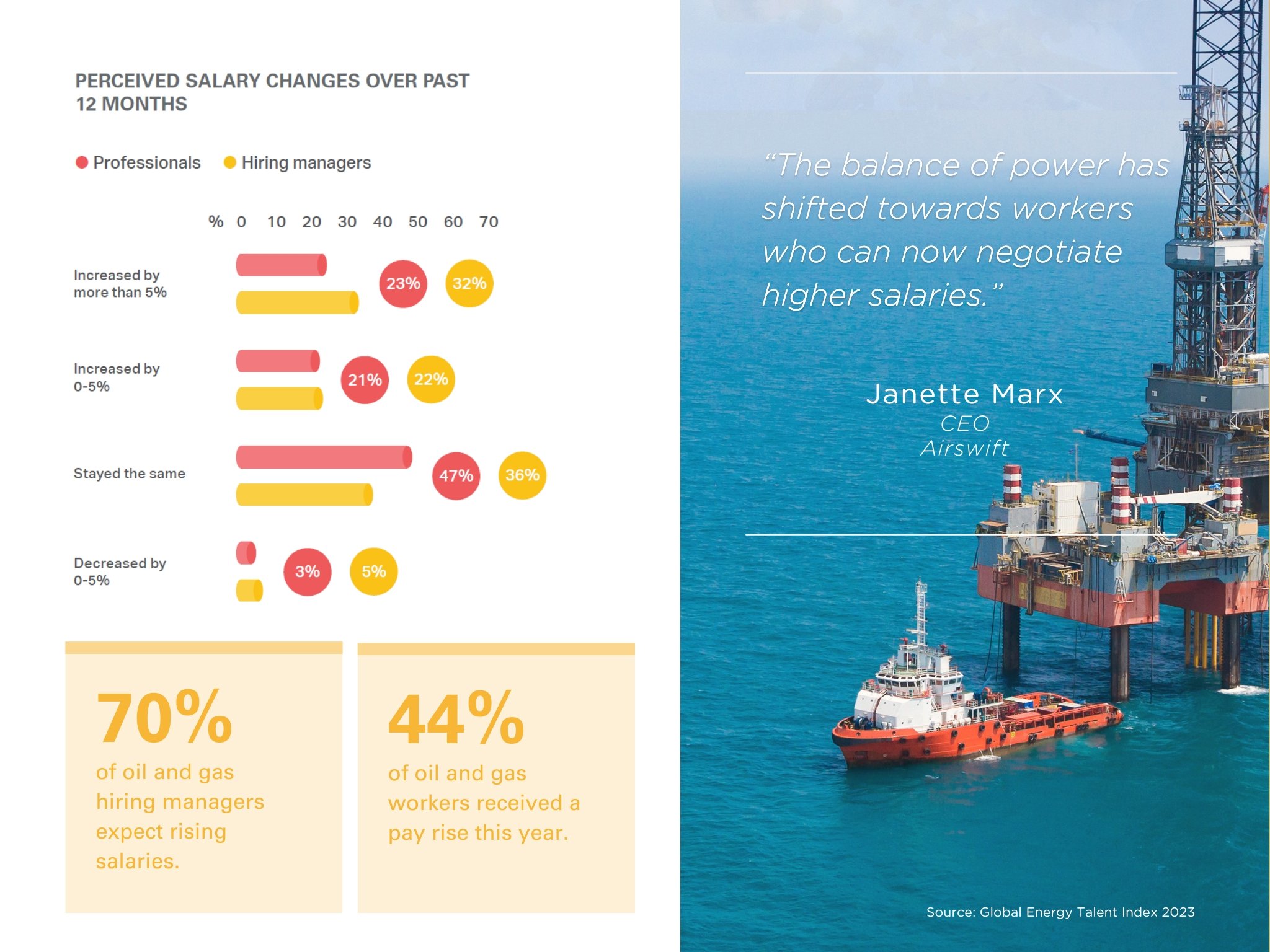
By
Leanna Seah
May 12, 2023
Updated
November 20, 2024
In our second GETI webinar, our Chief Revenue Officer, Anna Frazzetto, and President of ASPAC, Jayden Wallis, delved into the complex challenges of talent attraction and retention faced by the energy industry.
The discussion explored the stark differences between the traditional oil and gas sector and the burgeoning renewables industry while examining the critical role that environmental, social, and governance (ESG) factors play in this landscape.
Read our blog below as we deep dive into some of the unique talent acquisition and retention issues encountered by energy players and how companies can address them as they face a new generation of employees that, more and more, prioritise sustainability and social responsibility.
Is a pay gap offsetting the energy transition?
The oil and gas boom shows no signs of slowing down, with experts predicting it will continue well into 2030. As a result, optimism is high, and 68% of oil and gas professionals are anticipating pay raises in the coming year. Salaries have also skyrocketed to pre-pandemic heights, with 44% of employees receiving a pay rise this year.

It's no secret that pay and benefits are the top drivers of job satisfaction, and this salary hike has not gone unnoticed by other industries. In fact, over half of the renewable energy employees surveyed by GETI have expressed interest in jumping ship to the oil and gas industry – a 14% increase from the previous year.
This shift is raising concerns about its potential impact on the energy transition. At first glance, the increase in interest in oil and gas can seem significant, but it's important to remember the boom-bust nature of the industry. It's not uncommon for sectors to ebb and flow depending on fossil fuel prices so we may see a shift back to renewables in the future.
In any case, renewable energy firms need to consider the competitive landscape and ensure that their compensation packages are competitive to attract and retain top talent. This includes not just salaries but also benefits such as healthcare, retirement plans, and work-life balance initiatives.
ESG takes centre stage as oil and gas and renewables battle for top talent
In today's highly competitive job market, the oil and gas and renewable energy sectors face significant talent retention challenges. Within renewables, 31% of GETI respondents have been approached by companies at least six times. A quarter of those surveyed say they would consider leaving the energy sector altogether.
But it's not just renewables that are feeling the heat. Oil and gas' highly skilled and mobile workforce are in even greater demand - 80% have been solicited for new roles within the past year, with 40% of those approaches coming from outside the industry entirely.
While career progression remains a key driver for job moves, there's a new kid on the block - ESG
Environmental, social, and governance (ESG) concerns are increasingly becoming a top priority for both industries. In renewables, many employees are placing a higher value on companies with a strong ESG focus and female workers are twice as likely to cite culture, equity, and inclusion as a reason to change careers.
Meanwhile, for oil and gas workers, ESG is the second most influential factor in talent attraction and retention.
In today's rapidly changing job market, companies that prioritise ESG and provide ample opportunities for career progression will be well-positioned to attract and retain top talent.
Luckily for renewables, progress is the lifeblood of its success, and when it comes to tackling ESG concerns, the industry continues to shine. 73% of survey respondents say they are comfortable expressing their opinions and values at work. More than half feel their concerns are listened to and impact company policy - the highest of any sector.
This is a stark difference to the oil and gas sector, where only 45% of employees feel heard by their companies. Women are also more likely to feel ignored, and only 36% say that they feel they are listened to and have an impact on company policy.
Our takeaway is that while job satisfaction in oil and gas is high, it cannot remain solely dependent on its impressive salaries that fluctuate with the price of oil. As the talent war continues amidst an increasingly empowered workforce, it will have to add other, more meaningful differentiators to attract and retain talent.
ESG is essential to the employee value proposition (EVP)
Here are some steps energy businesses can take to incorporate ESG practices into their workforce strategy:
-
Create an ESG-forward culture by defining ESG goals and communicating them to employees. This can include initiatives to reduce carbon emissions, promote workplace diversity and inclusion, and increase corporate governance transparency.
-
Maintain open communication channels and conduct regular feedback sessions to engage with employees, gather feedback and make improvements to ongoing ESG initiatives.
-
Provide training and development opportunities to help employees improve their understanding of ESG. This can include programs related to ethical leadership, DEI and sustainability practices.
-
Offer incentives such as bonuses and recognition programs to employees who contribute significantly to ESG goals.
Enhance the employee experience with meaningful benefits
Comprehensive health packages and well-being initiatives are really important. Small things like additional vacation days and birthdays off can have a big impact. Mental health is something that affects more and more people and being able to provide support in these areas is equally important. Using a combination of these offerings can improve your EVP and help you attract and retain talent in today's market .
Jayden Wallis - President of ASPAC, Airswift
The COVID-19 pandemic forced a massive workforce migration, causing people to re-examine their lives and priorities. With the sudden shift to remote work, everyone had the chance to take a step back and reflect on their purpose, goals, and daily routine. For many, the lockdown clarified that the time had come to better align their work and personal lives.
Employees reflected on what they wanted to see in the post-covid workplace. Flexible work options, meaningful "soft" benefits, and diversity, equity and inclusion (DEI)-led initiatives are now highly valued alongside monetary perks such as performance bonuses and competitive pay packages.
The oil and gas and renewables industries depend on an expatriate workforce to develop new markets and opportunities. However, recent trends show that resistance to relocation is on the rise in both sectors.
In renewables, willingness to relocate has fallen by a tenth. In the oil and gas industry, the number of workers interested in moving abroad has decreased for the third year. Last year, 89% of oil and gas workers were willing to relocate, but that number has now fallen to 81%. This is a significant drop from 91% in 2021.
Family issues are a significant roadblock preventing many workers in both sectors from relocating. According to GETI, addressing this challenge is critical to sustaining a globally mobile workforce.
To make relocation more feasible for families, hiring managers must be willing to offer additional support. This could include more flexible work arrangements, such as remote work options or extended time off for family needs. Family assistance programs, such as childcare subsidies or assistance finding schools and housing, can also make a big difference in encouraging workers to relocate.

Smooth transitions: effective onboarding is vital to helping oil and gas talent thrive in renewables
The oil and gas workforce is experiencing a shift in priorities. More employees are becoming increasingly empowered to make career choices that reflect their personal values. And it's not just about the paycheck anymore.
Innovation, social responsibility, and sustainability are all becoming increasingly important factors. In fact, ESG considerations are now the third most influential factor when seeking new roles.
This change in mindset is reflected in the industry's statistics. Renewable energy is currently the most popular sector among 49% of oil and gas employees considering moving to a new energy sector.
While the transition of oil and gas talent to the renewables industry is promising, there is much to be done to harness the skills and expertise of these individuals effectively. According to Wallis, comprehensive onboarding programs are crucial to ensuring knowledge gaps due to industry-specific nuances can be identified and addressed.
Upskilling is also critical to success. The renewables sector must invest in training and development programs to ensure their new employees have the necessary skills to thrive in their new roles. This includes leveraging the transferable skills that former oil and gas players bring.
Foster an environment of continuous learning with mentorship programs

But mentorship programs are about more than just learning the ropes. They can also help build confidence in new arrivals, who may feel uncertain about transitioning to a new industry. By connecting them with trusted mentors, mentorship programs can help new employees feel supported and valued, improving job satisfaction and productivity.


